
Why Do Dogs Lick You? Understanding Your Dog’s Sticky Affections
If you’ve ever had a dog, you’ve probably received one (or many) of their slobbery kisses. But have you ever wondered why your dogs lick you?
Most pet parents believe it’s how they show affection, and though this may be true, it’s not merely a spontaneous and affectionate display of love—there’s actual science and psychology behind your pup’s licking.
Why Do Dogs Lick You?
Dogs lick people for several reasons. But the most likely reason your pup licks you is that it’s a natural behavior they learn from birth. Puppies lick their mothers for milk or food and to appease older dogs. Their mothers lick them back for grooming and bonding. When your dog licks you, it’s a way for them to express affection or empathy, greet you, or seek attention.
Our skin also carries various scents and tastes that are intriguing to dogs. We rely mostly on our vision to assess our environment, but dogs use their tongues and noses. Since dogs have a keen sense of smell, licking can be a way for them to explore these scents and tastes, much like exploring a buffet of interesting new smells and flavors.
Why Do Dogs Lick Your Hands?
Throughout your day, I’m sure you’ve handled quite a lot of things in and out of your home—your lunch, groceries, phone, keyboard, doorknobs, laundry, etc. These leave a variety of scents on our hands that dogs, with their excellent sense of smell, find very interesting. Your hands basically tell your dog where you’ve been and what you’ve encountered in your day.
Additionally, our palms sweat, and some dogs enjoy the salty flavor, which can be another reason they lick your hands.
What Does It Mean When Dogs Lick People on the Face?
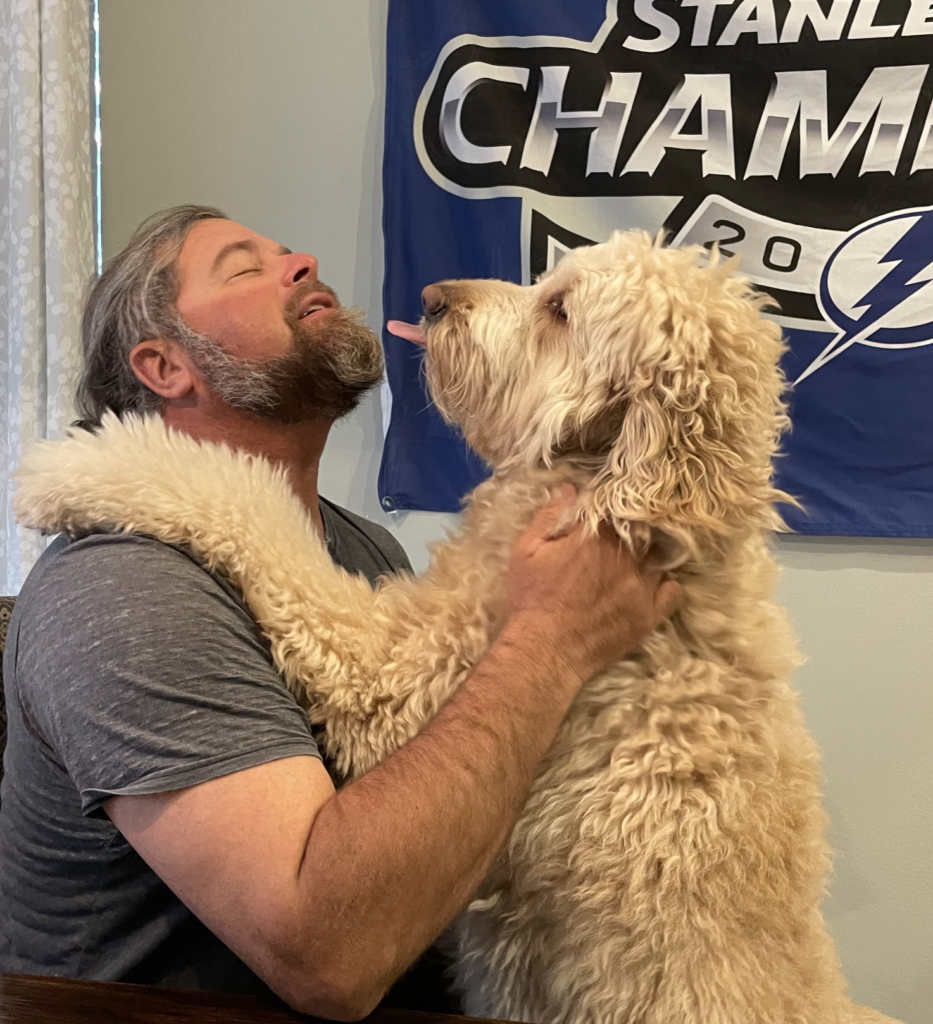
My friend Jamie gets a big face lick from his dog Phyllis (yes, that’s her name!)
Your face has many smells and tastes that interest your dog. You’re often exposed to different scents from the environment, and when you touch your face, you add even more interesting smells and tastes for your dog to explore and figure out.
That sandwich you had for lunch is probably another reason why your dog is licking your face—they’d like a “taste,” even if it’s just through the smell of your food. In fact, according to some researchers, their licking is a signal for you to throw up your lunch for them!
Aside from the scents your face has, dogs naturally lick faces as a social behavior, for grooming, showing affection, and communication. If you respond positively to your dog licking your face, it might encourage them to do it more often.
If you do let your dog lick you, remember to be mindful of the bacteria in their mouths. While most are harmless, some might cause problems if they enter open wounds. Since dogs explore the world through their mouths, regular veterinary check-ups are advisable to avoid potential risks when they lick your face.
Why Do Dogs Lick Your Ears, Feet, and Legs?
Dogs lick your ears and find them enticing for various reasons—a bit of grooming instinct, interesting smells and tastes, or perhaps just as a means of self-comfort. Your ear canals secrete a thick fluid that, when combined with the natural bacteria on your skin, creates an interesting odor that our pooches seem to find enticing, no matter how gross it sounds to us.
Your feet and legs are lickable gold mines for dogs. The combination of the salty flavor of your sweat, bacteria, and the diverse scents accumulated during the day can create a delightful feast for their taste buds. This is why dogs lick people every chance they get.
While this may seem cute, take caution in letting an especially young dog lick your feet or legs. You may have unknowingly carried viruses or bacteria that may be dangerous for puppies or senior or immunocompromised dogs.
Pin me!
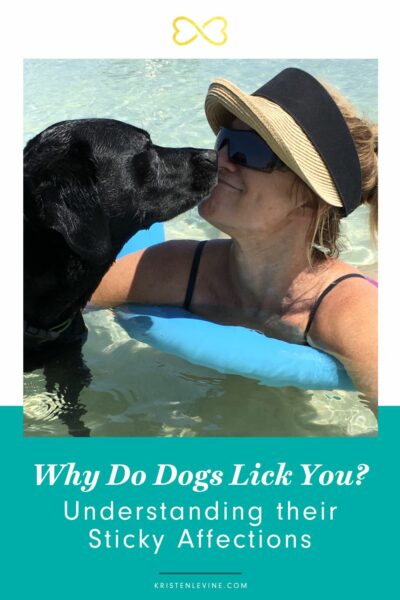
Should I Be Worried about My Dog’s Licking?
Dogs lick for plenty of reasons, boredom being one of them. If they lick out of boredom or to relieve stress, try toys or other activities, like putting their favorite wet food or a teaspoonful of peanut butter on a lick mat.
Excessive licking, however, may indicate an underlying health or behavioral issue.
Health issues like skin infections, allergies, pain, gastrointestinal problems, or dental disease can cause excessive licking in dogs. For example, dogs might lick due to skin problems like fleas, mites, yeast, bacterial, or fungal infections, which are often very itchy and uncomfortable. Allergies, both food and environmental, can also cause excessive licking, as can pain from conditions like arthritis or injuries.
On the behavioral side, dogs tend to lick as a self-soothing behavior or a compulsive habit, which may stem from dog anxiety. It’s important to provide your dog with enough stimulation and exercise to prevent these types of behaviors from developing. If the licking becomes uncontrollable, it might indicate a problem like separation anxiety, and you should consult with a veterinarian or a professional trainer.
Tips to Train Your Dog to Stop Licking You and Other People
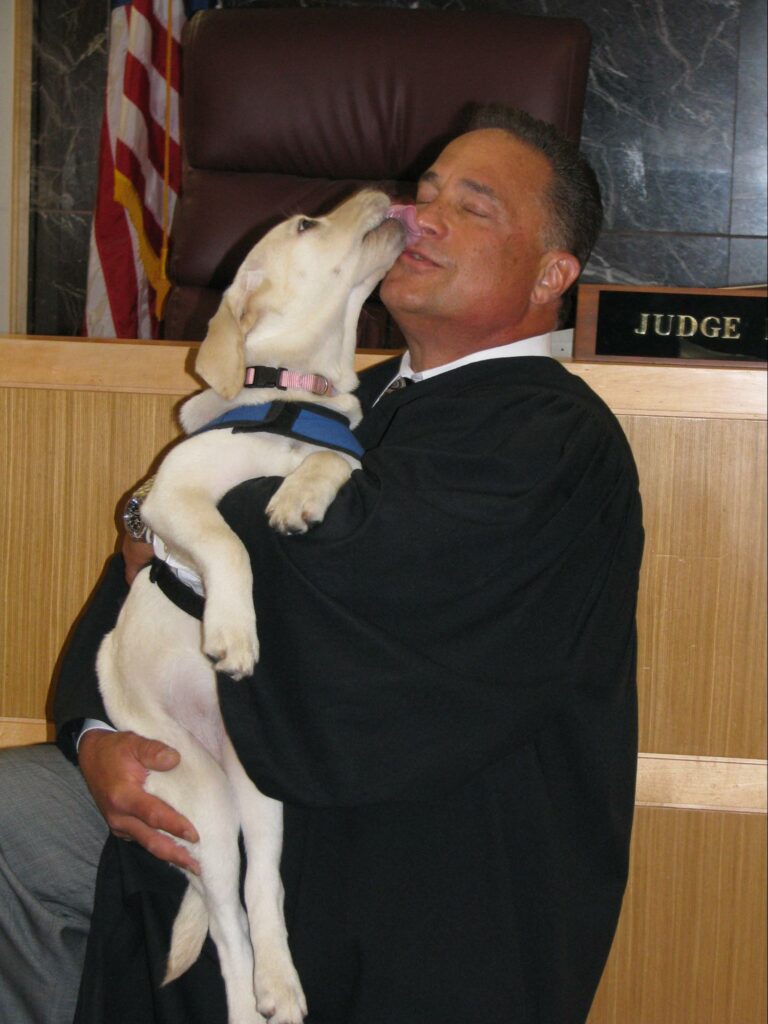
Guide dog in training gives my husband Paul a big lick in court!
If your pooch’s licking becomes bothersome, fear not—these are some tried-and-true tricks to help guide you and your pup:
Consult a professional: First and foremost, if you feel your dog’s licking has become excessive, get advice from your veterinarian. They can provide insights that fit your specific situation, identify underlying causes of excessive licking, and offer personalized tips to get your dog to stop or at least take it down a notch. A veterinary professional can evaluate your pup’s licking behavior while also being mindful of your environmental factors.
Ignore it: Sometimes your dog’s licking is the result of you, albeit unknowingly, encouraging it by reacting positively to their act of licking. Demonstrate to your dog that obsessive-compulsive disorder level of licking won’t garner the attention they seek. Young dogs tend to want your undivided attention, and if licking becomes a means to that end, it’s essential to break this cycle.
When your dog starts licking you, resist the urge to respond. Instead, stand up and leave the room. This communicates to them that their act of licking does not result in what they want. By being consistent in this, you communicate that licking is not the best way to engage with you.
Distract them: Introduce a toy or treat to redirect their focus away from dog licking. Many dogs, much like humans, can easily be distracted, especially when you have their favorite treats! When you notice them getting ready for a dog licking session, offer a toy or treat or engage them in a different activity.
Redirecting their focus diverts their attention and provides a positive alternative outlet for their energy. This can come in the form of rewards, praises, or affectionate gestures from you once your dog shows you the desired calmness. When you associate good behavior with positive reinforcement, your dog will gradually learn to substitute licking with more acceptable conduct.
Set clear boundaries: Be consistent with what you allow. If you don’t want your dog to lick your face or specific parts of your body, make sure you enforce this rule at all times. Ensure that all members of your household are on the same page. Dogs thrive on routine and clear expectations, so maintaining a united front as a family in discouraging licking will help a lot in your licking-curbing efforts.
FAQs
Should I Stop My Dogs When They’re Licking Me?
If your pooch’s licking is a bit too much, it’s completely fine to gently discourage the behavior. If, according to your veterinarian, their licking is normal, remember that it’s also their way of showing their affection or empathy toward you. To make sure your pup still feels your love, provide some alternative ways for them to express their affection and curiosity.
Why Does My Dog Lick Me in the Morning?
Dogs licking in the morning is their way of saying, “Good morning!” After a few hours apart from you, your dog licks you because they are happy to see you. Another reason is that they’re simply drawn to the subtle scent of your skin’s nighttime secretions. Either way, if you’re not enforcing any “no-lick” rule, it’s a cute way of starting the day on a positive note.
Why Does My Dog Lick Me When I’m Stroking Them?
Dogs licking after petting is their way of reciprocating the love you show them. Your pooch is enjoying the attention and can’t help but express their affection by giving you some licks in return. That, and they want you to continue giving them head pats and scratches.
Why Does My Dog Lick Only Me?
If your pup reserves their licks exclusively for you, take it as a compliment. Licking is a way for dogs to express submission, respect, and affection. In a canine social hierarchy, submissive members often lick the more dominant ones. When your dog is licking you, it might be acknowledging your role as the leader of the pack.
If you only have one dog, maybe it’s the fantastic cuddles, playtimes, or treats you provide. Or perhaps your unique scent and flavor, not to mention your natural bacteria, make you the ultimate licking target. Whatever the reason, you’re your pup’s favorite person.
The Final Woof
Licking is a natural behavior for our dogs, a way to explore and communicate as well as to show affection. If your pup’s licking doesn’t bother you, it’s fine to enjoy these wet, sticky expressions of their love.
However, it’s important to pay attention to changes in your dog’s licking behavior. If your lick-happy pup is giving fewer licks or your dog is suddenly licking you constantly and even aggressively, they may be experiencing some underlying issues. If you notice any significant changes, it’s a good idea to consult with your veterinarian to ensure your dog’s health and well-being.



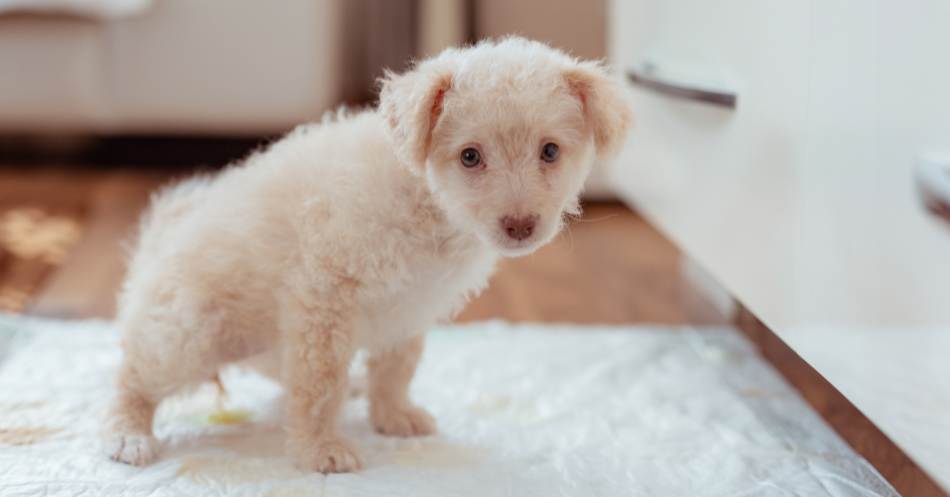
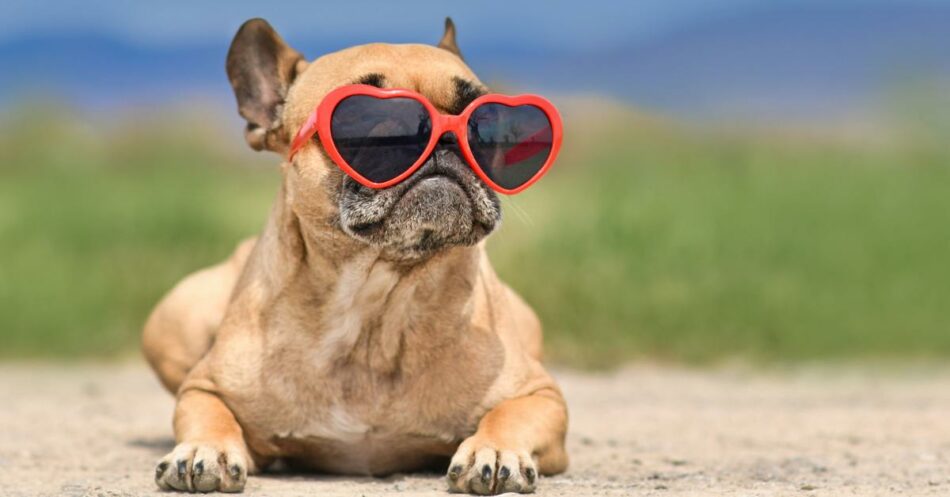
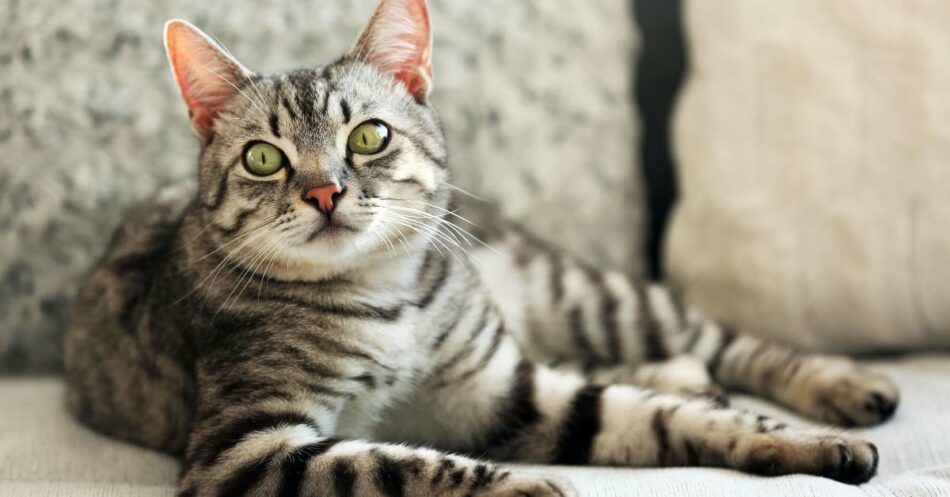
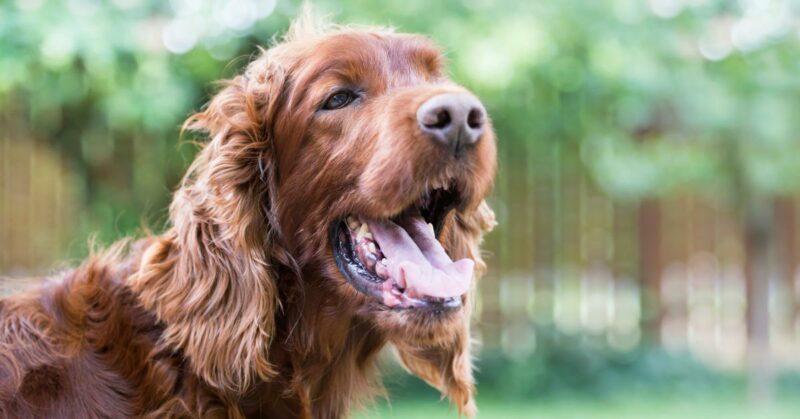
Thank you for all the info, i have a Toy Poodle called Asher that likes to kiss or lick me on my lips …like he is kissing me.
That is one way they communicate love! Just like us!
So true!